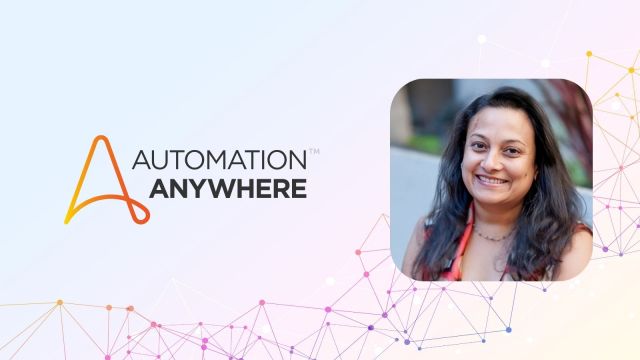“Technology has only one purpose, and that is human enablement, nothing else,” said Neeti Shukla, co-founder and chief social impact officer at Automation Anywhere. Artificial intelligence (AI) is rapidly redefining industries and the way we work. This makes questions of its broader implications inevitable.
Much of the discourse today revolves around economic disruption and job losses; there are people and organisations that are exploring new ways AI can help in addressing social challenges.

Shukla represents one such approach. Automation Anywhere has established what is known as an ‘impact office’ to focus on using AI and automation technologies for social good.
Defining AI for good
During the conversation, when asked what ‘AI for good’ really means, Shukla offered a straightforward framework. “If you look at it from that lens (enablement) – that we are enabling humans to do more, to do better, to do it easier, in whatever capacity – then when we look at AI for good, it is how can we serve a larger population, humanity, and community better by utilising AI?”
Unlike traditional corporate social responsibility programmes that often operate separately from core business functions, Shukla’s approach integrates social impact directly with technological expertise. According to her, this philosophy translates into three main areas of focus for her organisation’s social impact initiatives – bringing AI and automation to nonprofits, workforce reskilling and upskilling, and community give-back programmes.
Shukla shared that the company’s work with Akshaya Patra, a nonprofit that serves 2.4 million school lunches daily in India, illustrates their approach to working with mission-driven organisations. Instead of simply providing free software licences, Automation Anywhere has helped automate various operational processes. These include donor reconciliation, fleet management, and vendor coordination.
“If you are sourcing vegetables from 100 vendors for 70 kitchens, there’s bound to be inefficiencies; there’s bound to be last-minute needs,” Shukla noted. “Technology can be a great partner to the human delivery mechanism.”
According to her, this partnership extends beyond immediate efficiency gains. Akshaya Patra has set a goal to serve five million meals daily within five years, and Shukla describes their role as helping them to identify what systems and processes need to be in place to achieve that scale.
Story continues below this ad
The reskilling challenge
One of the most complex parts of AI’s social impact involves upskilling the workforce or managing them through the transition phase. While acknowledging the scale of change ahead, Shukla said, “The revolution that we are seeing in the way we work, the way companies work, and the way people work is just transformative. I think probably around the World War II era, and then after that, we haven’t seen this level of change that will affect almost everybody in some capacity.”
To address challenges around upskilling, Shukla shared that the company has made its training curriculum and a community edition of its software available for free. The company reportedly trained approximately 40,000 people through social impact programmes and works with 120 colleges in India through academic partnerships.
“We work with social partners that have a commitment to deliver on-the-ground training for tech,” Shukla explained. “The reason this is important is if you take folks who are not part of the mainstream education… then you really need a little bit more hand-holding.”
India as a test case
India presents unique opportunities for AI-driven social impact, according to Shukla. “India is a great use case of how the population has met the demands of that day,” she observed, citing the success of the outsourcing industry and improvements in literacy rates.
Story continues below this ad
The focus includes partnerships with organisations like Farmers to Forests, which uses drone technology to improve tree sapling survival rates, and Navjyoti, which provides entrepreneurship and financial literacy training to women.
“If we are able to help reskill and upskill the workforce in India… then they can actually give skill-based services versus just manual services,” Shukla said.
With rapid progress in AI and other technologies, apprehension over job security persists. Though Shukla acknowledges this reality, she firmly believes in maintaining a long-term positive outlook. “The World Economic Forum had a job report that came out in 2025 that said net-net, we will create 2 million more jobs because of these technologies,” she stated.
However, Shukla emphasised that managing the transition period is critical: “If we are able to upskill our own workforces within our own companies, then there’s less chance of layoffs. Remember, these employees are subject matter experts… Their experience is very valuable. The question is the skill set.”
On building trust
When it comes to implementing AI solutions in grassroots organisations, fostering trust is paramount, considering the skepticism around new technologies. Shukla describes their approach as a partnership. “We really deal with them as a partner, not a customer,” she explains.
Story continues below this ad
“Not only do we share the product and best practices, and we show up for volunteering, but even our partner ecosystem will step in, and we’ll ask for pro bono hours, and we’ll ask for mentors.”
The company’s recent ESG report indicates that it has impacted 500,000 people to date through various initiatives. For Shukla, this represents the core value of their work. “As a tech company, I have seen how technology has transformed every industry around us. When I see that it has transformed the lives of humans, to me, that’s worth gold.”
When asked what her advice would be for young changemakers interested in AI’s social applications, Shukla offered this perspective: “The future belongs to them. They will define it. They will shape it. Using technology is not optional in this world now – it is a requirement.”
As AI continues to evolve and integrate into various sectors, approaches like these represent one model for how technology companies might balance innovation with social responsibility. Whether such initiatives can effectively address the broader challenges of technological disruption remains an ongoing question, but they offer concrete examples of how AI might be directed toward social benefit rather than purely commercial ends.








